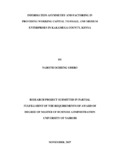| dc.description.abstract | Kenya like the rest of the world has not remained behind in recognizing the crucial role of Small and Medium Enterprises (SMEs). The significant parts SMEs play is underscored in Kenya's Vision 2030 - the development blueprint which seeks to transform Kenya into an industrialized middle-income country, providing a high-quality life to all its citizens by the year 2030. "Small and medium-sized enterprises account for the largest share of employment in the developing world. They are also more likely than large firms to be credit constrained. These businesses need working capital to operate, to grow and to compete in the marketplace. So access to finance is crucial to their success."(World Bank, Doing Business 2015). Despite the critical role played by Small and Medium Enterprises in Kenya, SMEs still face significant working capital constraints. This cash gap must be fulfilled using well thought out tools or method of financing. The purpose of this study was, therefore, to find out if information asymmetry (pre and post) affect adoption of debt factoring as working capital financing for SMEs. The specific objectives were to find out the effect of adverse selection and moral hazard on adoption of debt factoring by SMEs. The target populations were Small and Medium Enterprises in County government of Kakamega. The primary data were collected using structured questionnaire, coded and entered in the Statistical Packages for Social Sciences (SPSS) to aid in analysis.Descriptive statistics tools were used to analyze qualitative data, and inferential tools like regression and standard deviation were used in making conclusions on various aspects affecting the adoption of factoring as a source of working capital financing. Graphs, pie charts, tables were used in presenting the data after analysis. The study found out that there was a strong relationship between information asymmetry and adoption of factoring as a source of working capital financing. That, Information asymmetry has led to distrust by SMEs towards the financing institutions and thus hindered the adoption of factoring. Majority of SMEs owners were willing and ready to work closely with financing institutions and adopt factoring as a source of working capital if correct information is provided and a close working relationship is enhanced. | en_US |



